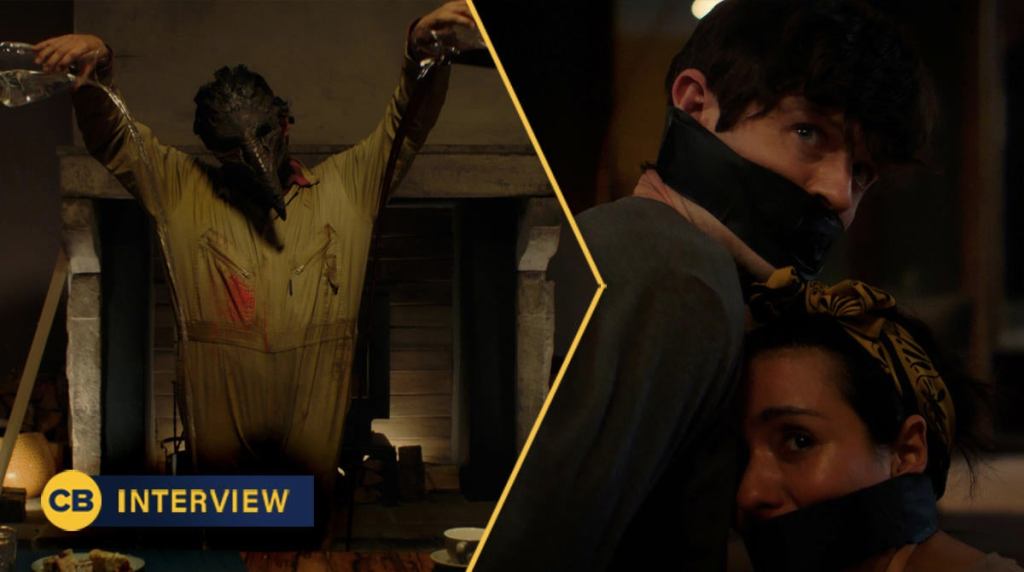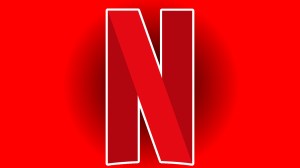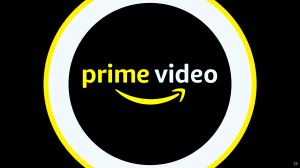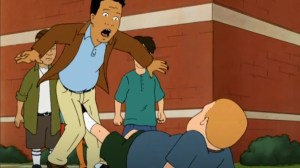Reuniting with former acquaintances after life has taken you down different paths can often come with unexpected stress and tension, which is where all the problems start in the new IFC Midnight film Barbarians. What starts as series of passive-aggressive jabs at one another among friends descends into an entirely horrific ordeal, rivaling any of the emotional unease experienced in the encounters that unfolded earlier in the evening. Iwan Rheon stars in the film, which was written and directed by Charles Dorfman, with the pair recently recalling the process of bringing the project to life. Barbarians is in theaters and On Demand now.
Videos by ComicBook.com
Set over the course of twenty-four hours, Barbarians sees couple Adam (Rheon) and Eva (Catalina Sandino Moreno) wake up in their supposed dream house on Adam’s birthday. Lucas (Tom Cullen), property developer and friend of the couple, arrives for dinner with his actress girlfriend Chloe (Inès Spiridonov), to celebrate Adam’s birthday and the couple’s buying of the house. But secrets unravel over dinner, and when the doorbell rings the evening takes a nightmarish turn. As manners give way to madness, an “idyllic” evening of celebration descends into a dark night of terror; and the group’s civilized dinner party turns out to be anything but.
ComicBook.com caught up with the pair to talk about on-set challenges, blending a variety of tones, and their uncomfortable dining experiences.

ComicBook.com: This movie Barbarians probably has the dinner date from Hell, so for the both of you, what is the worst dinner date or worst dinner experience, most awkward encounter that you’ve ever had to endure, without naming names that could embarrass anybody?
Iwan Rheon: Without naming names?
I mean, you can name names. You’re just going to be held accountable.
Rheon: I once had dinner and that person went to the toilet and I thought that they had gone, so I left, but they hadn’t gone. It wasn’t great, though, at the end.
We’ll let our imaginations figure out why they might have been gone for so long. Charles, can you think of your worst?
Charles Dorfman: I’m not sure about terrible, terrible. I mean, to be honest with you, after lockdown, having not socialized with anyone for so long, each one at the beginning felt pretty horrendous. I think everyone was pretty awkward and didn’t really know how to hold any conversation. So perhaps quite a lot of alcohol was involved and awkwardness, but we all got through it.
Well it sounds like compared to the events of Barbarians, you both lucked out in how badly it could have gone.
Dorfman: I’ve definitely been asked if I based it on a real experience and the answer is no.
Speaking to the development of the film and the script and the story, since there is the more emotional tension and awkwardness and relational tension, but then there is also more the overt horror, the more typical, straightforward horror or home invasion elements, what were the themes that came a little bit more organically to you? Did it start as one thing and then you injected another or was it a pretty organic process the whole time?
Dorfman: I think it was a development process where I did develop it, basically sitting around my kitchen table, acting out parts over quite a long time. And I think I was interested in the idea of this character, Adam, and this idea of being stuck in a state of, I guess, arrested emotional development. What would be a coming-of-age story for him? And without any external thing forcing you to grow up, perhaps you don’t need to, but then naturally you start thinking, why would you need to grow up? Well, because when chaos comes, you have to be prepared for it. And so then it felt like a natural, short, sharp shock to the system to add that element.
Iwan, as Charles just talked about, your character is at a bit of a crossroads where you believe yourself to be a director, that’s what defined you, but you’re potentially tasked with leaving that behind to maybe start family or live a quieter life. Since you obviously are an actor, you’re a musician as well, you have other careers that are open to you, have there ever been times in your life where you felt like you were at a crossroads when it came to acting, thinking, “You know what? I’ve had my fill and that was fun, but maybe this is a completely different thing that I pursue,”?
Rheon: Not with acting. It’s probably because … Yeah, there’s been times where I’ve thought, “Sh-t is this it? Is this going to happen? Is it all …?” Various stages, but I’ve always thought, I think it’s just something that I’ve always, this has always been the path that I was on from a very young age. I think having music as my, as a background thing that I do all the time and just something that I love and it’s no pressure on it, that really helps make the acting something that is a profession that I do as a career. It’s easier to deal with it, I guess, and then easier to deal with those times where you question yourself or you question whether you’re going to be able to do it, or whether it’s over or whether you’re ever going to work again, which is the greatest fear of an actor.
As far as your own personal connection to the material, when you’re seeking out projects, do you look for things that directly connect with your emotional state at the time or is it typically that you find a concept that you find interesting and then you work backward to see how you can emotionally connect to that character?
Rheon: Definitely the latter. I think, often with jobs, you can’t really expect anything and then something comes and then you look at it and go, “Yeah, brilliant.” And then from there, through discussions with the director and working with the other actors, you find this, taking from the script, you find the emotional pulse of the character and then that’s where it starts. But definitely I don’t — because you just don’t know what’s going to get made, I think it’s really important to be completely open. Then when something comes to them, then they can decide, “Oh, okay. Yeah, this is something I want to do.” And if you’re lucky, if you’re lucky you get to do it.
Over the course of the film, it’s not entirely a tense, disturbing, dark, grim, stressful experience. There are times where it almost feels like a playground rivalry between the main characters, they revert almost to that dynamic of bullying. So did you find it difficult to maintain that tone of not leaning too far into comedy, even though the antics that they’re getting up to feel silly at times, or was the tone sharpened in the editing process?
Dorfman: It’s a great question. I think I’m drawn to, I guess, quite uncomfortable comedy and that really is rooted in characters. I think the characters were as much defined by their relationship between each other and how they would relate to one another and the drama or tension or history with one another as what they were doing themselves. So the comedy came out of that, but I think the thrilling elements and the horror aspects of things also are best, they work best when you get to know the characters and you know who you’re dealing with, and then you can empathize and feel quite anxious when they’re going through things and you’re more engaged with the storytelling. So it was definitely on my mind whether or not this blend would work, but it felt natural to me to write it. So that’s what I ended up doing.
Another one for the both of you, looking back at the whole production, what was the most challenging day on set and what was the most fun day on set? And it might be the same day for both of those.
Dorfman: It’s not the same day. The most challenging day was definitely the first day of the invasion. We had an issue where we didn’t have a first for a day, it was also the first day where we were going to be using a steady cam. It was also the first day where we were going to be using masks around, the taping. So we ended up, there was a lot of logistical issues and we started late and it was incredibly stressful. That was the most stressful for me. And I had a friend visiting on set for some unknown reason that day, but that was the worst day, just because we started so late and there were a lot of moving parts and some things fell through the cracks.
The best day, it’s hard to pinpoint the exact one, but I think doing the really long takes around the dinner table and hearing the lines that I’ve written in the mouths of these actors was amazing. I just remember really, just like, “Pinch me. I can’t believe this is actually happening.” And it was a great day, great days. There were definitely moments, we did really, really long takes and it just felt like an organic play and I loved it.
Rheon: I think that in terms of my favorite days were those that, I mean, I don’t know … It’s hard to figure out what day, because there was one in particular where it was just, because you didn’t move the camera a lot, so it felt like these incredible … We were basically doing this huge, long sequence, but because we’d rehearsed it and all the rhythm just came and we were just really playing off each other and all four of us really bouncing off each other. So I really enjoyed that.
I think the most challenging day was the bloody fox, is just … I mean, which day? Because we just had to keep reshooting it and the fox’s agent was so powerful. You weren’t allowed to look the fox in the eye and all this stuff. Method fox. Yeah, it was challenging. It was just because it was so important for the script and you’re just asking a wild animal to do something, it’s just crazy. But yeah, that was the most challenging I think.
But obviously when the whole, all the invasion stuff, all I had to worry about was getting tape on my face.
And Iwan, your Game of Thrones costars Kit Harington and Richard Madden followed in your footsteps by jumping over into the Marvel Cinematic Universe, you set the standard…
Rheon: Yeah. They’re always copying me there. They just want to be me. I’ve stopped taking their calls now.
If you were to reunite with them by returning to the MCU, would you want to reprise your Inhumans role or would you rather take on a new character?
Rheon: I’ll take anything, really. I’d love to have another crack at, I’d love to do Maximus again. I think he’s a really interesting character. And also I feel a bit sorry for him, because he is just stuck on the Moon still, but yeah, I’d love to do any of that stuff. Anything. I’m not fussy, give me anything.
Barbarians is out now in theaters and On Demand.
This interview has been edited for length and clarity. You can contact Patrick Cavanaugh directly on Twitter.








